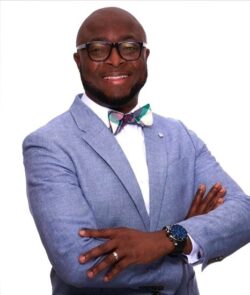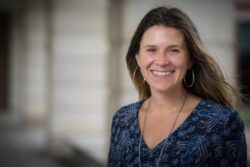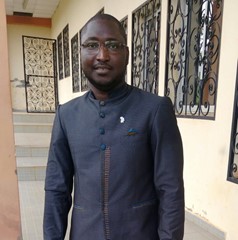RTAC Presents: The Faces of Peacebuilding
POSTED May 19, 2021
|Working in Crises and Conflict
By Nigel Gibbs, RTAC Communications Manager
With the recent passing of International Day of Living Together in Peace, the Research Technical Assistance Center (RTAC) is highlighting some of our researchers involved in peacebuilding. The United Nations’ May 16 commemoration is a time for “the international community to promote peace, tolerance, inclusion, understanding and solidarity…to uphold the desire to live and act together, united in differences and diversity, in order to build a sustainable world of peace, solidarity and harmony.” At RTAC, our diverse and inclusive community of scholars help challenge long-held assumptions and supply policymakers with the critical research needed to make informed decisions. The unique expertise and experience of Doctors Obasesam Okoi, Erica Frantz, and Mady Ibrahim Kante offer perspectives on who are the actors in peacebuilding and what might be necessary to create a society where peace is the norm. Researching conflict in various countries, they come to this area of study with differing perspectives and conclusions, but collectively raise important questions about what factors instigate conflict and what may help resolve it.

Obasesam Okoi, Ph.D., is an Assistant Professor of Justice and Peace Studies at University of St. Thomas in St. Paul, Minnesota. His research examines the challenges of post-conflict peacebuilding policies and practices in African societies, with a particular focus on Nigeria’s oil region. Dr. Okoi’s research has addressed three interconnected themes: (1) developing new ways to conceptualize the dynamics of natural resource conflict and armed insurgency; (2) developing a conceptual understanding of the connection between population displacement, human rights, and peace; and (3) evaluating the success and failure of post-conflict peacebuilding policies and practices. His examination of these themes has become a model for others in the field of conflict and peacebuilding.
Dr. Okoi’s research has shed light on Nigeria’s effort to disarm, demobilize, and reintegrate 30,000 insurgents who had declared war against the state and energy corporations for over two decades, and the challenges emerging from post-conflict peacebuilding processes in the Niger Delta oil region. Dr. Okoi has worked with more than 400 former insurgents to understand the impact of specific peacebuilding interventions on their communities. From this research, he was able to develop a conflict transformation model which shows “for a conflict to transform, identifiable changes must take place in a post-conflict society, and in the lives of former insurgents, across four levels—cultural, intrapersonal, structural, and interpersonal. Falling short in any of these levels might result in merely stabilizing a post-conflict society without necessarily eliminating the root causes of violence.”
For a conflict to transform, identifiable changes must take place in a post-conflict society, and in the lives of former insurgents, across four levels—cultural, intrapersonal, structural, and interpersonal.Dr. Okoi, Ph.D
Dr. Okoi believes the path to achieving a sustainable peace requires a complex and multifaceted approach. Society needs to first, “promote ethical and responsible business practices while holding transnational and multinational corporations accountable for human rights violations.” Secondly, the multidimensional causes of poverty must be addressed and an equitable wealth distribution plan for the world’s poorest people must be implemented. Third, there needs to be a reshaping of the global governance institutions “to give development a humane face and eliminate unequal terms of trade between developed and developing countries.” The fourth challenge would be to tackle issues of bigotry, recognizing the equal worth and dignity of all human beings regardless of race, age, sex, nationality, disability, and gender.
 Erica Frantz, Ph.D., is an Associate Professor of Comparative Politics at Michigan State University who specializes in authoritarian politics, with a focus on democratization, conflict, and development. Through her research, she has found authoritarian regimes are tied to many of the world’s conflicts, making it critical that we gain a better understanding of the politics within them and the factors that motivate their leaders’ decisions.
Erica Frantz, Ph.D., is an Associate Professor of Comparative Politics at Michigan State University who specializes in authoritarian politics, with a focus on democratization, conflict, and development. Through her research, she has found authoritarian regimes are tied to many of the world’s conflicts, making it critical that we gain a better understanding of the politics within them and the factors that motivate their leaders’ decisions.
Her works sheds light on how the institutional environment in which authoritarians operate influences their policy choices. “One of the central patterns to emerge is that concentration of power – as exemplified in personalist dictatorship – is destructive for global peace. Personalist dictators are more likely than other authoritarians to pursue risky and aggressive foreign policies; they are the most likely to fight wars against democracies and initiate conflicts more generally; and they are the most likely to invest in nuclear weapons.” She believes society must continue, “pushing back against the global rise in strongman rule that we have witnessed in the last decade.” If society fails to do so, conflict outcomes are bound to be worse.
The reality is that though conflict and crises outside of our borders may not directly affect us, their indirect effects are enormous, ranging from refugee crises to the spread of disease.Dr. Frantz, Ph.D
Dr. Frantz’s research has shown authoritarianism, poverty, and conflict are overlapping. “Many of the world’s most pressing conflicts today are occurring in dictatorships, in places as varied as Syria, Ethiopia, and Venezuela; likewise, these are the very parts of the world facing economic crises. Democratic institutions are difficult to sustain amid poverty, just as lasting peace is. Addressing the challenge of poverty globally would therefore go a long way toward improving prospects for peace and the viability of stable democracy.” The only way to achieve the lofty goal of world peace is to get leaders and the citizens who support them to see global peace as something which benefits the whole world. “The reality is that though conflict and crises outside of our borders may not directly affect us, their indirect effects are enormous, ranging from refugee crises to the spread of disease. To fulfill the goal of the International Day of Living Together in Peace, we need to make it clearer to key actors that global peace is good for everyone.”
 Mady Ibrahim Kante, Ph.D., is the Head of the Research and Studies Department of the Timbuktu Institute at Bamako University in Bamako, Mali. His areas of expertise include political science, international relations, governance and regional integration, policies and development strategies, conflict, and terrorism.
Mady Ibrahim Kante, Ph.D., is the Head of the Research and Studies Department of the Timbuktu Institute at Bamako University in Bamako, Mali. His areas of expertise include political science, international relations, governance and regional integration, policies and development strategies, conflict, and terrorism.
Dr. Kante has been working for more than ten years as a researcher on conflict, terrorism, and peacekeeping. The value he places on being out in the field to better understand a situation has brought him to supervise projects in West Africa, and to the Sahel, where he was able to learn more about the root causes of terrorism, the radicalization of young people, as well as their integration into extremist groups. Through his work, local and international policy makers can use his research as guide to address the problems that arise in conflicts throughout Africa.
“I have been to the field several times to work on youth radicalization in the Sahel and I have concluded that the main factor of radicalization is an economic one.”Dr. Kante, Ph.D
Dr. Kante believes there are several factors which can trigger a conflict and experts must consider the economic, social, geostrategic context of a situation. Terrorism in his opinion, is often born out of an economic crisis giving rise to ideological conflicts. To build peace, it is necessary to have a deep knowledge of the factors of the conflict, and then to take the necessary measures and implement mechanisms to apply them effectively on the ground. “I have been to the field several times to work on youth radicalization in the Sahel and I have concluded that the main factor of radicalization is an economic one.” His work in the Sahel and subsequent field studies, have allowed him to understand and identify the terrorist phenomena of extremism, and subsequently, publish policy papers on management of terrorist threats and the fight against radicalization.
Dr. Kante is of the opinion that conflicts in Africa, particularly in Mali, are due primarily to economic troubles. His time in field has proved to him that development initiatives need to play a bigger role in peacekeeping and peacebuilding process. Additionally, while he is appreciative of their work, he is an advocate of adjustments in the way peacekeeping missions approach conflicts. The current mandate in peacekeeping missions has proven problematic to him. “Conflicts are worsening day by day… it will be necessary [for stakeholders] to determine a realistic mandate for each conflict based on the nature of the conflict in question.” They must prevent the, “influence of powerful countries that try to safeguard their interest, allowing for the effective execution of their mandates, to ultimately help create peace.”
